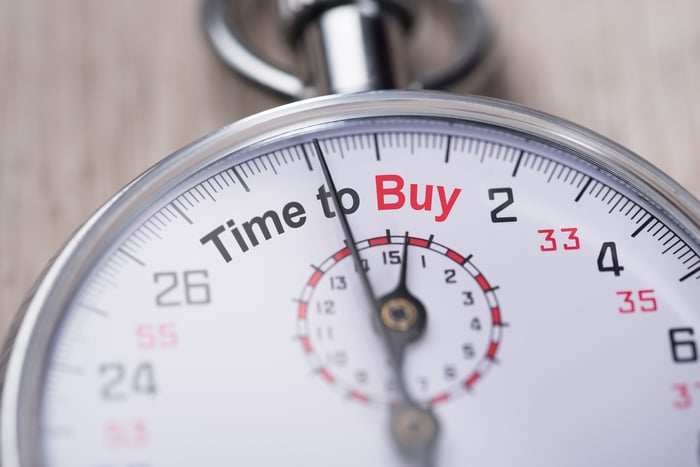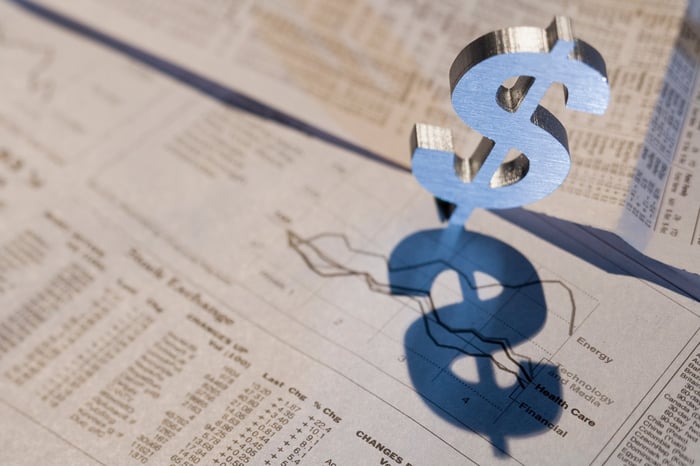When Warren Buffett, the CEO of conglomerate Berkshire Hathaway (BRK.A -0.68%) (BRK.B -0.52%), buys or sells a stock, Wall Street and investors tend to pay close attention. That's because Buffett has had a knack for running circles around the broader market since he became CEO back in 1965.
Since taking the reins, Buffett has created close to $670 billion in value for his shareholders (which includes himself), and he's led his company's Class A shares (BRK.A) to an almost unfathomable 20.1% average annual return. Over 57 years, a 20.1% average annual return works out to a gain of 3,641,613%!

Image source: The Motley Fool.
To put this performance in another context, the benchmark S&P 500 has "only" gained 30,209%, including dividends paid, since Buffett took over Berkshire Hathaway. This means Buffett's company could lose 99% of its value, and it would still be handily outperforming the S&P 500 since the start of 1965.
Warren Buffett went on a shopping spree in the first quarter
Because riding the Oracle of Omaha's coattails has been such a lucrative strategy for decades, investors wait attentively for Berkshire Hathaway's Form 13F filings each quarter.
A 13F effectively provides a snapshot of what successful money managers with at least $100 million in assets under management bought, sold, and held in the previous quarter. Although 13F data is filed at least six weeks following the end of a quarter, it still provides critical information regarding what stocks and/or trends are captivating the brightest minds on Wall Street.
With the Nasdaq Composite tumbling into a bear market during the first quarter, Buffett and his investing team chose to put a significant portion of Berkshire's capital to work. All told, the Oracle of Omaha invested $51 billion in 14 stocks (eight of which he already owned). This included Apple (AAPL -1.71%) and Chevron (CVX -0.77%), which are two of Berkshire Hathaway's top three holdings, based on market value.

Image source: Apple.
Buffett has probably invested around $50 billion, combined, in Apple and Chevron
Tech giant Apple is the unquestioned pillar of Buffett's investment portfolio. The more than 911 million shares owned (including what New England Asset Management holds) by Berkshire equate to $125.4 billion in market value and 38.4% of Berkshire's $326.6 billion portfolio.
As I've previously pointed out, Apple checks all the appropriate boxes as a long-term Buffett investment. The company sports incredible branding power, has a loyal customer base, and its innovation continues to drive sales and profits to new records. Apple's CEO, Tim Cook, also has a handle on the company's operations and is successfully overseeing a transition to a more subscription-service-oriented model. This should help reduce the revenue fluctuations associated with device replacement cycles.
Meanwhile, integrated oil and gas company Chevron has become Buffett's new darling. After holding "just" $4.5 billion worth of Chevron stock to end 2021, Berkshire Hathaway purchased close to 121 million shares in the first quarter.
Aside from Chevron paying out a market-topping dividend and pledging $10 billion for share repurchases this year, Buffett's fascination with Chevron likely has to do with the expectation that oil and natural gas prices will remain elevated for years. The combination of Russia invading Ukraine and the COVID-19 pandemic creating a disincentive for energy companies to invest in infrastructure will likely cap crude and natural gas supply for a while.
Buffett's letter to shareholders earlier this year outlined a $31.1 billion cost basis in Apple and a $3.4 billion cost basis in Chevron. Including Berkshire's buys during the first quarter, it appears that Buffett and his investing team have spent in the neighborhood of $50 billion combined, buying Apple and Chevron since the beginning of 2016.

Image source: Getty Images.
Buffett has put over $61 billion to work in this under-the-radar company since July 2018
But what if I told you there was a stock that isn't as well-known as Apple or Chevron that Buffett has bought even more of in a shorter time frame?
Better yet, what if I told you this stock wouldn't even show up on Berkshire Hathaway's quarterly 13F filings?
The mystery stock that the Oracle of Omaha can't get enough of is, perhaps fittingly, his own company, Berkshire Hathaway (cue the dramatic plot-twist music).
Prior to mid-July 2018, Buffett and his right-hand man Charlie Munger were only allowed to repurchase shares of their own company's stock if it dipped below 120% of its book value (i.e., was trading no more than 20% above the company's per-share book value). For virtually the entirety of the past decade, Berkshire Hathaway's book value never dipped to 120%.
But things changed in July 2018. Berkshire's board passed new measures that allowed Buffett and Munger to repurchase stock if two conditions were met. First, the company needs to have at least $20 billion in cash, cash equivalents, and U.S. Treasuries on hand. Second, Buffett and Munger have to agree that their company's stock is trading below its intrinsic value.
Since this change was made, Buffett and Munger have overseen $61.1 billion in share repurchases in what amounts to three years and nine months.

Image source: Getty Images.
Although Berkshire Hathaway isn't a household name quite like Apple, Chevron, or even Warren Buffett, it's built to succeed. For instance, the vast majority of Berkshire Hathaway's portfolio is tied up in cyclical companies. Even though recessions are an inevitable part of the economic cycle, they generally don't last very long. By comparison, economic expansions can last years. Buffett has set Berkshire Hathaway up to benefit immensely from these disproportionately long periods of expansion.
Buffett's company is also raking in dividend income. Over the next 12 months, Berkshire Hathaway is set to collect more than $6 billion in passive income, including preferred stock dividends. Companies that pay a dividend are often profitable, time-tested, and have significantly outperformed their non-dividend peers over the long run.
And let's not forget that buying back stock tends to have a positive impact on Berkshire Hathaway's share price over time.
As Wall Street marvels at Buffett's Chevron and Apple purchases in the first quarter, don't forget about Buffett's unquestioned favorite stock of all: Berkshire Hathaway.





